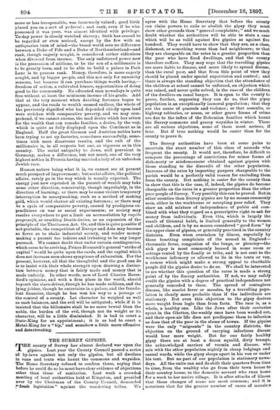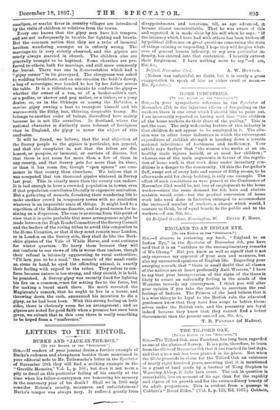THE SURREY GIPSIES.
r:county of Surrey has almost declared war upon the ipsies. Last year the County Council passed a series of by-laws against not only the gipsies, but all dwellers in vans and tents who haunt the commons and waysides. The Home Secretary refused to confirm these, saying that before he could do so he must have clear evidence of objections other than those of sanitation. Last week a crowded meeting of local authorities held at Kingston, and presided over by the Chairman of the County Council, demanded ,f•freah legislation" against the wandering tribes. We
agree with the Home Secretary that before the county can claim powers to exile or abolish the gipsy they mud show other grounds than "general complaints;" and we much doubt whether the authorities will be able to state a case which will be as valid against five gipsies as against five hundred. They would have to show that they are, as a class, dishonest, or something worse than bad neighbours; or that they are chargeable on the rates in a greater proportion than, the poor who have fixed dwellings, and that the county therefore suffers. They may urge that the travelling gipsies are more liable to disease, and more likely to spread disease, than the rural poor, and that from this point of view they should be placed under special supervision and control ; and there is always the standing objection that the attendance of the children at school cannot be enforced, an objection which was raised, and never quite solved, in the case of the children of the dwellers on canal barges. It is open to the county to. prove, further, supposing they can do so, that the gipsy population is an exceptionally immoral population; that they are the cause of quarrels and violence ; or that assaults, or highway robberies, or arson, or other grave forms of crime are due to the influx of the Bohemian families which haunt the Surrey commons and grassy waysides in winter. These are all serious objections, some of them most serious, if true. But if true nothing would be easier than for the county to prove it.
The Surrey authorities have been at some pains to. ascertain the exact number of this class of nomads who frequent the county. It would not, therefore, be difficult to compare the percentage of convictions for minor forms of dishonesty or misdemeanour obtained against gipsies with those standing to the discredit of the other population. Increase of the rates by importing paupers chargeable to the parish would be a perfectly valid reason for excluding them from the county. But nothing is easier for the county than to show that this is the case, if, indeed, the gipsies do become chargeable on the rates in a greater proportion than the other poor people of Surrey. Very possibly this can be proved. But in other counties than Surrey gipsies are by no means commonly seen, either in the workhouse or accepting poor relief. They show an odd mixture of independence of public aid com- bined with what they regard as a prescriptive right to ask for money from individuals. Even this, which is largely the result of Oriental habit, is limited generally to the women and children, and is by no means considered "good form" by the upper class of gipsies, or generally practised in the country districts. Even when overtaken by illness, especially by those besetting complaints of the nomad in England— rheumatic fever, congestion of the lungs, or pleurisy—the sick gipsy is most commonly housed in some room or cottage rented by the family or tribe, and is not sent to the workhouse infirmary or allowed to lie in the tents or van,. a course which might make a strong appeal to charitable people did the gipsies desire to do so. We shall be interested to see whether this question of the rates is made a strong point of by the Surrey authorities. If not, we may safely credit the gipsies with a degree of practical independence not generally conceded to them. The spread of contagious disease, like scarlet fever or measles, by a travelling popu- lation is clearly more probable than if the individuals are stationary. But even this objection to the gipsy derives. more weight from logic than from facts. The race is, as a whole, a healthy one. Like the Jews after their centuries. spent in the Ghettos, the weakly ones have been weeded out, and their open-air life does not predispose them to infection as does that of the poor in the slums of towns. If the gipsies- were the only "migrants" in the country districts, the objection on the ground of carrying infectious disease would bear more weight. But for one fairly healthy gipsy there are at least a dozen squalid, dirty tramps, the acknowledged carriers of vermin and disease, who mix with the other population nightly in cheap lodgings and casual wards, while the gipsy sleeps apart in his van or under his tent. But no part of our population is stationary nowa- days. All the units can and do shift their quarters from time to time, from the wealthy who go from their town house to their country house, to the domestic servant who runs home for a week to her native village. It is after attacks of illness that these changes of scene are most common; and it is notorious that Liz the greater number of cases of meaele
smallpox, or scarlet fever in country villages are introduced by the visits of children or relatives from the towns.
Every one knows that the gipsy men have hot tempers, and are not unfrequently in trouble for fighting and brawls. But the common notion that they are a tribe of immoral heathen wandering amongst us is entirely wrong. The marriage-tie is very strictly observed, and the gipsies are nearly always married in church. The children also are generally brought to be baptised. Some churches are pre- ferred to others, both for marriage, and still more commonly for burial. There was one in Somersetshire which had a 4' gipsy corner" in its graveyard. The clergyman was asked to wedding breakfasts, and on one occasion the bride's dowry,
bag of sovereigns, was handed to her by her father across the table. It is a ridiculous mistake to confuse the gipsy- whether the owner of a van, or of a basket-seller's cart, or a pedlar, or skewer and peg maker, or a tinker, or a pony dealer, or, as in the Orkneys or among the Hebrides, a marine gipsy owning a boat to transport himself and his wares—with the filthy, lost, thieving, despicable tramp. He belongs to another order of beings, discredited here mainly because he is not like ourselves. In Scotland, where the national character is distinctly more tolerant of foreigners than in England, the gips), is never the object of this -confusion.
It will be found, we believe, that the real objection of -the Surrey people to the gipsies is particular, not general, and that the complaint is, not that the tribes are dis- honest, or paupers, or immoral, or carriers of disease, but that there is not room for more than a few of them in any county, and that Surrey gets far more than its share, or than it has room for, though "open spaces" are com- moner in that county than elsewhere. We believe that it was computed that ten thousand gipsies wintered in Surrey last year. This is clearly more than the county can endure. It is bad enough to have a crowded population in towns, even if that population contributes liberally to expensive sanitation. But a gathering of nomads forsaking their wandering life to make another crowd in temporary towns with no sanitation whatever is an impossible state of things. It might lead to a repetition of the Maidstone disaster, and is good reason for in- sisting on a dispersion. The case is so strong from this point of view that it is quite probable that some arrangement might be made between the High Roads Committee of the Surrey Council and the leaders of the roving tribes to avoid this congestion in the Home Counties, or that if they must remain near London, or in London on the Surrey side, they shall do like the Berk- shire gipsies of the Vale of White Horse, and rent cottages for winter quarters. To harry them because they will not conform to our views of life is worse than useless, though their refusal is intensely aggravating to rural authorities; lam n you to be a toad," the remark of the small rustic as, stone in hand, he eyed the offending animal, is exactly their feeling with regard to the tribes. They refuse to con- form because nature is too strong, and they should, it is held, be punished. A Surrey gipsy was recently fined for lighting his fire on a common,—not for setting fire to the furze, but for making a burnt mark there. He much resented the Magistrate's remark, that he ought to live in a house, and throwing down the cash, announced his intention to die a .gipsy, as he had been born. With this strong feeling on both sides, there is obviously room for an arrangement ; and as gipsies are noted for good faith when a promise has once been given, we submit that in this case there is really something to be hoped from a "conference."







































 Previous page
Previous page